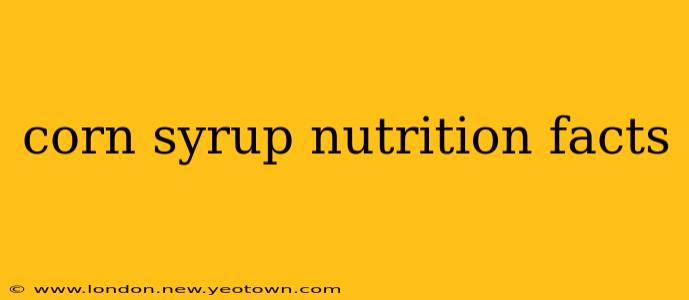Corn syrup. The word itself conjures images of sugary treats and processed foods. But what exactly is corn syrup, and what are the nutritional facts behind its ubiquitous presence in our kitchens and pantries? Let's unravel the mystery surrounding this common sweetener, exploring its composition, its impact on our health, and answering some frequently asked questions.
Our journey begins with understanding the basics. Corn syrup isn't a single entity; it comes in various forms, each with slightly different properties. The most common types are high-fructose corn syrup (HFCS) and corn syrup solids. HFCS, often the subject of much debate, is made by processing cornstarch into glucose and then converting a portion of it into fructose. This conversion results in a sweeter liquid than regular corn syrup, making it attractive to food manufacturers. Corn syrup solids, on the other hand, are a dried form of corn syrup, used primarily as a stabilizer or sweetener in baked goods and processed foods.
What are the nutritional facts of corn syrup?
The nutritional content of corn syrup varies depending on the type and processing. Generally, corn syrup is primarily carbohydrates, providing energy but lacking significant amounts of vitamins, minerals, or fiber. A typical serving (approximately 1 tablespoon or 15 grams) of corn syrup contains around 45 calories, all of which come from carbohydrates. It's essentially pure sugar.
Is corn syrup the same as sugar?
While both corn syrup and sugar (sucrose) are carbohydrates and provide calories, they aren't identical. Sucrose is a disaccharide, composed of glucose and fructose bound together. HFCS, however, contains mostly free glucose and fructose. This difference influences how the body metabolizes each sweetener, although the net caloric effect is similar.
What are the health effects of corn syrup consumption?
The health impact of corn syrup consumption, especially HFCS, is a subject of ongoing research. High consumption of added sugars, including corn syrup, has been linked to weight gain, type 2 diabetes, heart disease, and non-alcoholic fatty liver disease. However, it's important to note that these are correlations, not necessarily direct causations. A balanced diet and an active lifestyle play crucial roles in mitigating potential risks associated with added sugar intake. Moderation is key; consuming corn syrup in excessive amounts can undoubtedly contribute to negative health outcomes.
Is corn syrup bad for you?
The question of whether corn syrup is "bad" is complex and doesn't have a simple yes or no answer. In moderation, corn syrup isn't inherently harmful. The problem arises when it's consumed in large quantities as part of a diet already high in added sugars and low in nutrients. Focusing on whole foods, limiting processed foods with added sugars, and maintaining a balanced lifestyle are far more impactful than singling out corn syrup as the sole culprit.
What are the alternatives to corn syrup?
Fortunately, plenty of healthier alternatives to corn syrup exist, depending on your needs. For baking, you could use honey, maple syrup, or agave nectar. These natural sweeteners offer additional flavor and micronutrients, although they also contain calories. In some recipes, you can reduce the amount of sweetener or even omit it altogether, depending on the desired outcome. Always read food labels carefully to understand the ingredients and choose options with lower added sugar content.
In conclusion, understanding corn syrup's nutritional facts is crucial for making informed dietary choices. While it's not inherently toxic, excessive consumption can contribute to health problems. A balanced diet, incorporating natural sweeteners sparingly and focusing on whole foods, remains the most effective strategy for maintaining well-being. Remember, moderation and awareness are key to a healthy relationship with any sweetener, including corn syrup.

